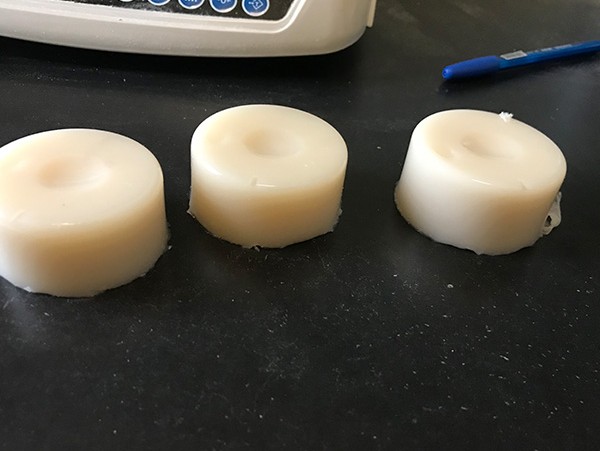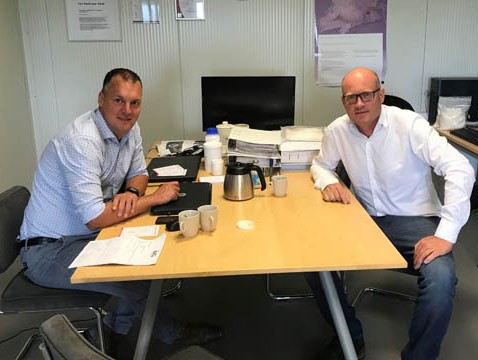
The empty landscape won’t have you suspect that here, between the potato fields of North-East Groningen, there’s a modest factory where innovation, sustainability and efficiency meet in an ‘industrial protein’. Meet Meatproteïns.
“When you make meatballs at home, you add an egg for to bond the meat. We supply the industrial egg in the meatball.” This is how director Jacques ten Kate explains what happen at Meatproteïns in a simplified manner. He saw the genesis of the company in 2012, which has since developed into a successful manufacturer of collagen (proteins), made from cowhide. The company services the international meat processing industry, especially large processing parties and manufacturers of blends (mixes that are put in meat) in the meat industry and the halal market, for which strong certification is attained.
The start-up was a challenge at the time, because there was no demand on the market. But Ten Kate, trying his hand at entrepreneurship after a career in aviation and family business Ten Kate Vetten, believed in his new product. Passionately, he explains his decision: “Worldwide, more and more meet is industrialised. This brings new challenges. With technical consumables, you can improve the quality of meat without lowering the experience of the meat. In the meat industry, soy proteins are often used. So no proteins common to meat, for which you also have to cut down half a rainforest. Collagen from cowhide is a protein common to meat, made from a by-product from livestock farming.”

“Our product distinguishes itself in functionality: it has, among others, a strong water-binding and emulsifying capabilities”, new manager Laurens Maathuis adds. “What’s more, it increases the elasticity of the meat product and you can easily reduce the amount of salt and fat with barely any loss of taste experience.” By now, many (potential) clients are familiar with the ability to add proteins in order to improve the quality of their product; they regularly call upon Meatproteïns with specific development products. There was recently a question from the smoked sausage industry, where moisture seepage, often visible in vacuum sealed smoked sausages, regularly occurs. A problem that was solved with Meatproteïns’ application. Ten Kate gives a few more examples in which his product provides a solution. They managed to tackle warped salami slices on pizzas by adding collagen. “And Asians want their meat to be more firm. They often store their products outside for the fridge for a long time, so they must be suitably sterilised. Our proteins survive that strong stabilisation and sterilisation process and provide the desired bite at the same time.”
Where in other parts of the world, meat consumption increases, here there’s a call for eating less meat. Maathuis tells: “it may seem like a paradox, but we meet this trend. The products in which our proteins are incorporated can be produced with a lot less meat without changing the experience, flavour or reliability of the product. Our proteins are free of E-numbers and can be declared as beef collagen. They also contribute to a cleaner label.”

Sustainability is also an important factor in the product and process. Ten Kate says: “Meat is produced in a way that greatly burdens the environment. By using cowhide in a food grade product, we lower CO₂ emission”. Additionally, Meatproteïns’ factory and the two neighbouring ones do a service to each other (and the environment) by sharing in the necessary and released energy. The waste energy and energy from the potato factory Avébé go to Meatproteïns through a long pipe, who then supplies gelatine factory Gelita with its waste heat. And even in its own factory, Meatproteïns’ trademark efficiency can be seen. Only three tubular machines and three employees per team give shape to the ultra-swift production process; turning cowhide into processable protein takes only 30 minutes. “It can also be done with two people, but three is safer”, Ten Kate says, who clearly cares deeply about his employees.
The final project can be supplied in three forms: injectable, in cubes or in a standard ground version. Ten Kate says about the self-developed procedure: “By using low temperature and barely using acids and other aggressive substances, we can extract the protein and turn it into these forms. A unique method, which gives our product, among others, emulsifying properties. The high amount of effectiveness and sustainability that can be found in the entire management is why we can offer our product at a low price in the competitive meat industry. This low price goes together with sustainability. This way, we try to help the food chain become more efficient”.
Source: © Meatproteins